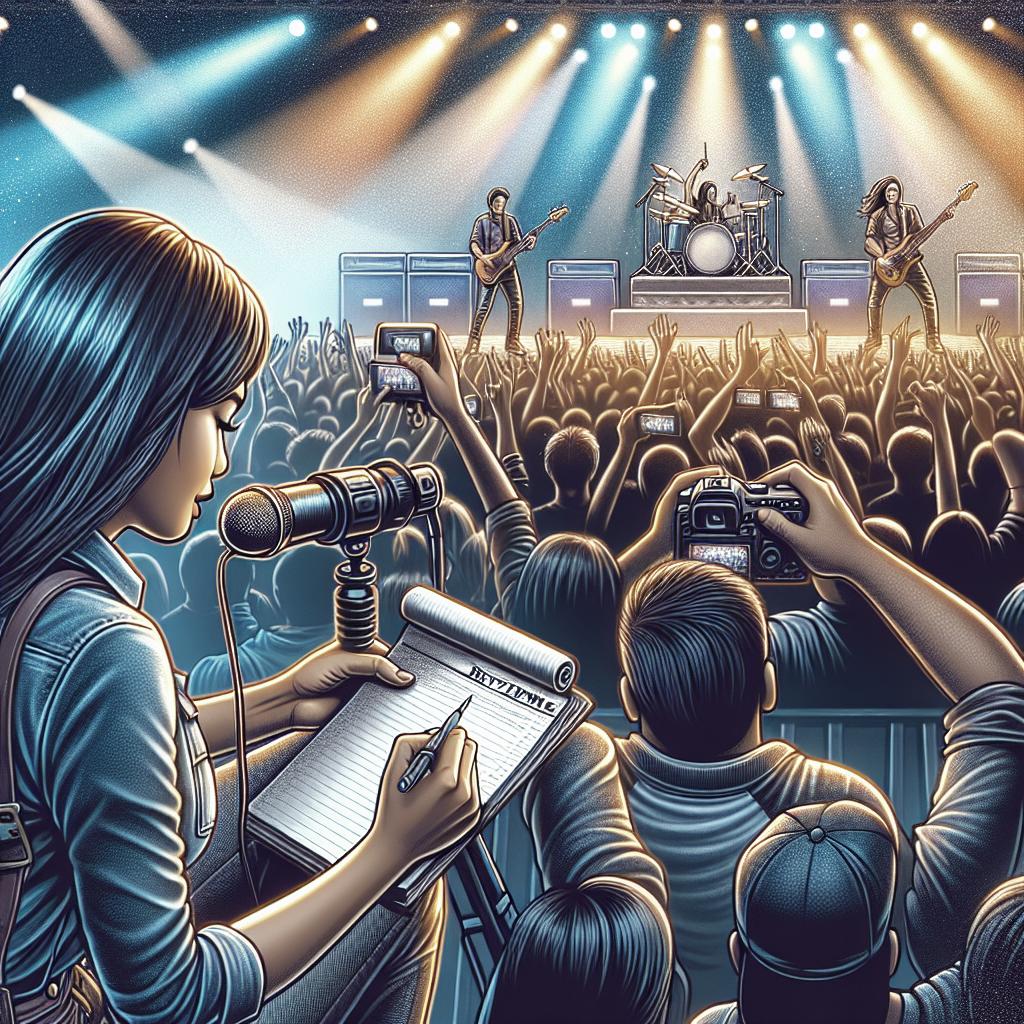Sure! Here is the blog post as requested: —
Introduction: Understanding the Importance of Concert Reviews
Concert reviews play an essential role in the music industry, providing feedback for artists and informing potential concertgoers. They serve as historical documents, capturing the live music experience and offering insight into the vitality and talent of musicians. Writing an effective concert review requires preparation, keen observation, and thoughtful analysis. This post will explore each step necessary for crafting a comprehensive and engaging concert review, from preparatory measures to the final write-up. By following these guidelines, you can create reviews that resonate well with your audience and contribute meaningfully to the world of music journalism.
The Impact on the Music Industry
Concert reviews have a profound impact on the music industry, serving as a vital feedback loop for artists, promoters, and record labels. Positive reviews can boost an artist’s reputation, attract new fans, and increase ticket sales for future concerts. Conversely, constructive criticism helps musicians and their teams understand areas for improvement, fostering growth and evolution in their performances. Thus, well-crafted reviews contribute to the overall development of the music scene by promoting excellence and innovation. In addition to benefiting artists, concert reviews also influence industry trends and highlight emerging talent. Established media outlets and influential bloggers can set the tone for which shows are deemed “must-see” and which new artists deserve attention. This curatorial role can shape public opinion and dictate the trajectory of musical careers, demonstrating the considerable power wielded by concert reviewers.
Guiding Audience Choices
Concert reviews also serve to inform and guide audiences who are deciding which concerts to attend. Reviews provide detailed accounts of what potential concertgoers can expect, from the quality of the music and performance to the overall atmosphere and venue experience. This information is invaluable for fans who are deciding where to invest their time and money. Moreover, well-written reviews can encapsulate the essence of a live performance, allowing readers to experience the show vicariously. For many, concert reviews offer a way to connect to the broader music community, share in collective experiences, and make informed choices about future events. By providing honest and insightful reviews, you can help fans make more informed decisions, ultimately enhancing their concert-going experiences.
Preparing for the Concert Experience
Plan Ahead for the Concert
Effective concert reviews start long before the music begins. Research the artist’s background, discography, and previous performances to gain an understanding of their style, influences, and evolution. Familiarize yourself with setlists from prior shows on the tour, as this can provide insight into what you might expect and help you identify standout moments. Additionally, arrive at the venue early. This allows you to familiarize yourself with the layout, sound quality, and audience demographics. By doing so, you can better contextualize your review, offering readers a comprehensive account of the entire concert experience.
Get Your Concert Essentials Ready
Preparation includes gathering your concert essentials. Bring a notebook and pen for jotting down highlights and impressions throughout the performance. Alternatively, use a note-taking app on your smartphone for quick and organized documentation. Make sure your phone is fully charged and equipped with a reliable camera if you plan to include photos in your review. Consider bringing ear protection, particularly if the concert is in a small, crowded venue with high decibel levels. Keeping hydrated and packing a light snack can also help you stay comfortable and focused during the performance. By being well-prepared, you ensure that you’re ready to capture every critical detail of the concert.
Observing and Engaging with the Performances
Connecting with the Artist’s Emotions
One of the key aspects of a memorable concert review is the ability to convey the emotional impact of the performance. Pay close attention to the artist’s body language, facial expressions, and interactions with the audience. Describe how they connect with their fans, whether through poignant storytelling, impassioned singing, or energetic stage presence. Engaging with the artist’s emotions enables your readers to understand the performance’s affective core. Capture moments where the artist’s emotions visibly moved the audience, such as when a touching ballad brought the crowd to tears or an upbeat anthem had everyone dancing. These visceral reactions provide readers with a deeper sense of the concert’s atmosphere.
Noting Technical Proficiency
Beyond the emotional connection, technical proficiency is also essential to a comprehensive concert review. Evaluate the musicianship of the performers, including their instrumental skills, vocal range, and overall stagecraft. Take note of any moments of technical brilliance, such as impressive guitar solos, intricate drum patterns, or harmonious vocal harmonies. It’s also important to consider the sound quality and technical setup of the concert. Comment on the effectiveness of the sound engineering, the balance between instruments, and the acoustics of the venue. A well-rounded review should mention any technical difficulties, such as microphone feedback or poor mixing, and how these issues were addressed.
Analyzing Musical Elements and Artistic Choices
Instrumentation and Arrangement
The instrumentation and arrangement of a live performance can significantly shape the listening experience. Pay attention to how the band utilizes different instruments to create a rich and dynamic soundscape. Describe the interplay between the instruments and how they complement each other, contributing to the overall musical texture. Assess the arrangement of the songs performed. Consider how the artist transitions between different sections, the use of crescendos and decrescendos, and the incorporation of improvisational elements. Highlight any innovative or unique arrangements that stood out during the concert, and discuss how these choices enhanced or detracted from the performance.
Vocal Performance
The vocal performance is often the centerpiece of a live concert. Evaluate the lead singer’s vocal quality, including their pitch, tone, and articulation. Note any variations or improvisations in their delivery compared to studio recordings. Describe how the vocalist adapts to the live setting, connecting with the audience through their voice. Consider the backing vocals and harmonies as well. Discuss how they contribute to the overall sound and whether they enhance the lead vocals. Pay attention to any vocal effects used, such as reverb or auto-tune, and how they impact the performance’s authenticity and emotional resonance.
Crafting a Structured and Informative Review
Highlight Key Aspects
A well-structured concert review should highlight the most memorable aspects of the performance. Begin with an engaging introduction that sets the stage, followed by a detailed account of the key moments. Focus on the standout songs, exceptional solos, and any unexpected surprises during the show. Provide a balanced view by also mentioning any areas that fell short of expectations. This could include technical difficulties, weaker song performances, or any aspect of the concert that didn’t resonate well with the audience. By offering a comprehensive overview, you provide readers with a nuanced and accurate representation of the concert experience.
Provide Personal Insights
Offering personal insights can make your concert review more relatable and engaging for readers. Share your initial expectations, how the performance measured up, and your overall emotional response to the show. Reflect on moments that left a lasting impression and discuss why they were significant to you. Personal anecdotes and reflections add depth to your review, transforming it from a mere recap into a vivid narrative. By incorporating your unique perspective, you create a connection with your readers, allowing them to see the concert through your eyes and enhancing the authenticity of your review.
Adding Personal Insights and Reflections
Connecting with the Music
Sharing how you personally connected with the music is a crucial part of a compelling concert review. Describe how specific songs or performances resonated with you emotionally, whether through lyrics, melodies, or the overall vibe. Tell your readers how the music made you feel and why it was meaningful to you. These personal connections help readers understand the concert’s impact on an individual level. Whether the music transported you to a different time and place, brought back memories, or simply created a powerful emotional response, sharing these experiences adds authenticity and depth to your review.
Relating to the Artist
Building a connection with the artist is another important element of a great concert review. Share any insights you gained from observing the artist’s performance, stage presence, and interactions with the audience. Discuss how the artist’s personality, charisma, and engagement influenced your perception of the concert. Reflect on any moments where you felt a genuine connection with the artist, such as when they shared personal stories, expressed gratitude to the audience, or delivered an impassioned performance. By articulating these connections, you provide readers with a greater understanding of the artist’s character and the authenticity of their performance.
Formatting and Editing Your Concert Review
Organize Your Thoughts
After gathering your notes and insights, take the time to organize your thoughts before drafting your review. Create an outline that includes the main points you want to cover, such as the highlights of the performance, technical elements, and personal reflections. This structure will help you create a coherent and logical flow for your review. Consider breaking your review into sections, each with a clear focus. This makes it easier for readers to follow your narrative and understand your analysis. Use headings, subheadings, and bullet points to enhance readability and guide readers through your review.
Include Details
Details are essential for bringing your concert review to life. Include specific information about the date, location, and venue of the concert. Mention the setlist, special guest appearances, and any notable moments that stood out. Descriptive language can help readers visualize the atmosphere, from the energy of the crowd to the lighting and stage effects. Pay attention to nuances, such as the interactions between band members, the artist’s wardrobe, and the audience’s reactions. These details add richness to your review, making it more engaging and informative for readers. Ensure that your review is as vivid and comprehensive as possible.
Tips for Improving Your Concert Review Writing Skills
1. Attend the Concert with a Critical Eye
Attending concerts with a critical eye is essential for creating insightful reviews. While enjoying the live music experience, remain attentive to the performance elements you’re evaluating. Watch for technical precision, emotional delivery, and audience engagement. Balancing enjoyment with critical observation helps you provide a well-rounded review. Take note of initial impressions as well as evolving thoughts throughout the concert. Stay vigilant for subtle details and nuances that might influence your overall assessment. This approach ensures that your review captures the full spectrum of the concert experience, from start to finish.
2. Take Detailed Notes During the Concert
Detailed note-taking is a crucial skill for concert reviewers. Document key moments, memorable performances, and any technical issues you observe. Jot down your immediate reactions and thoughts to capture the raw essence of the experience. Notes should be concise but comprehensive, highlighting both positive and critical observations. After the concert, review your notes and identify patterns or recurring themes. This will assist you in organizing your review and ensuring that you don’t overlook any significant points. Detailed notes provide a solid foundation for writing a thorough and engaging concert review.
3. Analyze the Musical Elements
Analyzing the musical elements of a concert allows you to provide a more in-depth review. Focus on the structure and dynamics of the performance, including song arrangements, instrumentation, and vocal quality. Evaluate how these elements interact to create the overall atmosphere of the concert. Pay attention to tempo changes, key modulations, and harmonic structures. Assess the artist’s improvisational skills and how they adapt their studio recordings for a live audience. By delving into these musical elements, you offer readers a richer understanding of the performance and its artistic significance.
Frequently Asked Questions
Q: What should I focus on when reviewing a concert? A: Focus on the overall experience, including the artist’s performance, technical proficiency, emotional connection, and audience engagement. Highlight key moments and provide personal insights to enhance your review. Q: How can I improve my concert review writing skills? A: Improve your skills by attending concerts with a critical eye, taking detailed notes, and analyzing the musical elements. Practice regularly and seek feedback from peers to refine your writing. Q: Should I include personal opinions in my concert review? A: Yes, personal opinions add depth and authenticity to your review. Share your emotional responses and connections to the music and artist to create a more engaging narrative for your readers.
Final Thoughts
Reviewing live concerts effectively requires preparation, keen observation, and thoughtful analysis. From planning ahead and gathering concert essentials to connecting with the artist’s emotions and noting technical proficiency, every step plays a vital role in crafting a comprehensive review. By highlighting key aspects, providing personal insights, and organizing your thoughts, you can create engaging content that resonates with your audience and contributes to the music industry.
| Aspect | Details |
|---|---|
| Impact on the Music Industry | Provides feedback, influences trends, highlights emerging talent |
| Guiding Audience Choices | Informs and guides potential concertgoers’ decisions |
| Preparing for the Concert | Plan ahead, gather essentials, research artist and venue |
| Observing Performances | Connect with emotions, note technical proficiency |
| Analyzing Musical Elements | Instrumentation, arrangement, vocal performance |
| Crafting the Review | Structured highlights, personal insights, detailed observations |
| Improving Skills | Attend concert critically, take notes, analyze music |
This framework will enable you to write compelling and informative concert reviews, enhancing both your skills as a reviewer and the experiences of your readers. —


